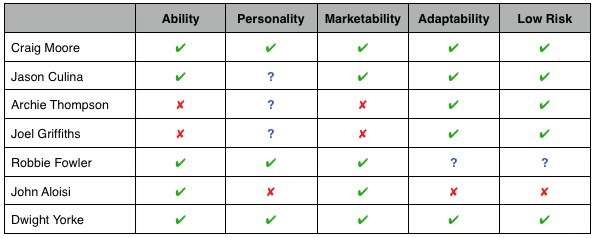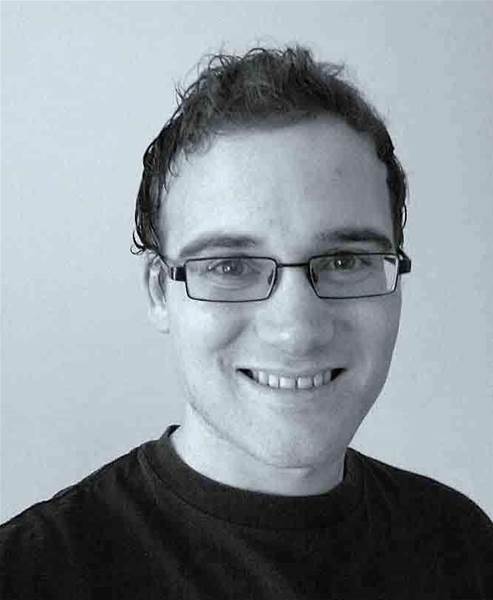DURING the past few months, Perth Glory coach David Mitchell has continued to reiterate that he refuses to be rushed into the capture of a marquee player.
Such things, he reasons, need a good deal of research and due diligence before cash is handed out. He has a point - if you look back over the history of the A-League, there are few players who have really lived up to the expectation of what a marquee should be.
Names like Mario Jardel, Stan Lazaridis, and Paul Agostino haven't exactly set the world on fire during their respective stints as marquee player. So, what is it that A-League coaches are missing? What makes a good marquee? In my mind, you can outline five key attributes that make up a good marquee player. These are, in no particular order;
Ability - Probably the most obvious quality of a good marquee player is that he needs to be at a skill level above and beyond the rest of his club, if not the competition. This is your flagship player - someone to spark the team into life, a second captain who can inspire his teammates through sheer footballing ability alone. That precision tackle in the last line of defence, every time - or that set piece which is always going to hit someone's head, or better still, the back of the net. Think here players who have performed at the top level - in World Cups and in the globe's top leagues.
Personality - A player with the profile of a marquee signing has to live up to certain expectations. How the player handles this is integral to how successful they'll be for their team. If they get on well with the media, like the spotlight, and love the game as a whole, it will go a long way towards raising the profile of their club and sport. A personable player is easy to market and fits in easier with their teammates - especially important if they're being paid five times as much as anyone else in the squad! Their attitude must not be that they're coming to the A-League to retire or have fun in the sun - that puts fans of the game, even those of their own club, offside very quickly. They should instead be revving the crowd up, getting them involved in the game, and all-up creating great entertainment.
Marketability - But the marquee position isn't just designed for players who shout a lot and have good ball skills. Ideally, you also want to get a name - a brand, if you will. David Beckham isn't a footballer - he's a freakin' commercial enterprise. There are thousands of better footballers out there; yet if you bring him to Sydney he'll play to a packed house. Your marquee shouldn't just be preaching to the converted - he should be out there converting the heathens! Walk up to the average Joe in Perth and ask if he knows who Ibrahimovic, Maldini, or Messi are and he'll probably tell you they're a brand of electrical appliance. Ask the same guy who David Beckham is and he'll go, "oh he's that soccer guy". Yes, he's that soccer guy! A-League teams, believe it or not, would benefit from a "soccer guy" too - someone to spark the curiousity of the non-footballing public.
Adaptability - Okay, so you've signed a star striker from La Liga. He might be getting a little old, and he's not as quick as he once was, but his faculties are still all there and he's going to be able to slot goals left, right, and centre. You're chuffed. Then the games start and you gradually begin to realise that this star you've signed is slowly being starved to death, as the guy passing the ball to him is more used to hacking people down than threading pin-point through-balls. So your striker just sits there and waits and everyone gets very upset - whoops! We've established before that the A-League isn't comparable to Europe; you won't get pin-point crosses every time or acres of space created by a sublime passing game - you just won't. A good marquee should be able to adapt to this and get involved anyway - not just faff about trying to draw a foul. You see Messrs Muscat and Tiatto over there? They'll foul you all right... and leave you a paraplegic while you're at it.
Low Risk - There's an element of risk in everything, and marquee players are no different. But there are obvious warning signs that teams should be heeding when searching for their flagship player. For a start, if your target has played about 20 games in the last three years, that's generally not a good thing. If he can't fit through the door of the office for an interview, that's probably a warning sign too. You simply can't take chances with the fitness of high-profile signings, as fans of both Sydney and Glory have found out. Then there's the player's attitude - if they're in it for the money alone then you've got trouble on your hands. The fans won't like that, the player might not try very hard, and you're going to look very silly for signing him. There would surely be nothing more expensive or pointless than an unpopular marquee player.
With all this in mind, and yours truly sounding like he should have taken a job with Pointless Statistical Analysis Ltd, here's a pretty picture:

The above table shows the marquee class of 2009-2010 so far, marked according to the criteria I specified above. For comparison's sake, I've included the man who is widely recognised as THE marquee player - Dwight Yorke, former Manchester United star and A-League title winner with Sydney FC. No doubt you're all ready to jump down my throat in defence of your respective stars, but I've tried to be as objective as possible and I have my reasons for the ratings I have given.
Firstly, the footballing ability of Joel Griffiths and Archie Thompson is not being called into question in the above table - they're both very good players in their own right. But when you pit their abilities against the other players we're considering, they pale in comparison.
Moore, Yorke, and co. have all played at the top level in Europe, they've played starring roles in World Cups, and they've beaten opponents of a quality that someone like Griffiths may never face. To me, Melbourne and Newcastle have simply elected to take their best Australian players and place them outside the salary cap.
Perhaps you can't argue with the three championships won between the two teams (you can, but I won't here), but to my mind this isn't how the marquee position should be used. Mind you, it means it's easy for them to adapt to the A-League, as their teammates are roughly at the same level (give or take a bit of overseas experience).
Perhaps this is something that players like Stan Lazaridis and John Aloisi have struggled with - when you've spent time in England and Spain with some of the best players in the world, you might wonder why your new teammates aren't making great runs for you, or can't thread a pass between a packed defence.
You would think there's a question mark over Robbie Fowler for the same reason; he's a predator in front of goal, but someone's got to get the ball to him. Yorke on the other hand is a shining example of adaptability - a striker in his glory days, Dwight was moved into the midfield for Sydney and thrived.
He scored seven goals and was responsible for countless others; including setting up Steve Corica in the sky blues' Grand Final win as part of a man-of-the-match performance.
Dwight was also very personable, making him a boon for Sydney's PR department and that of the league as a whole. This made marketing the club easy - if you can't market a guy with the personality of Dwight Yorke, there's no hope for you.
We know Robbie Fowler fits into the same sort of category - former EPL star, legend of a world beating club, but the risky part here is whether he can stay fit. Yorke did and was a success. If Fowler can't, it could be a very big blow for a new franchise like the Fury.
Craig Moore is probably one of the better marquees besides Sydney's favourite import - but his kind of personality appeals directly to Australians without any sort of smile or flashy lifestyle. It doesn't matter if Moore is lining up against Recoba or Robinson - he'll still be standing there with a look on his face that says, "Try getting past me, and I'll knock the living !@#% out of you".
It's the kind of look one must only be able to learn in places like Glasgow and Newcastle. He's also patriotic, tough as nails, and a fearless leader. Can you say the same about Culina, Griffiths, Thompson, or Aloisi? (Though to be fair to Jason, we won't know until we see him in action).
Moore to me is one of the few exceptions to the "somewhat-disappointing Australian marquee" rule. Besides, as cynical as it sounds, how utterly marketable is a cancer-surviving World Cup hero? Compare that to Joel Griffiths or Archie Thompson, whom I think I once saw in a Weetbix ad.
John "Penalty Taker" Aloisi is certainly marketable- he even tells us how to get rid of dandruff for crying out loud- but he is also a risky proposition, having got much of the Sydney fanbase off-side last year with poor performances and a bad run of injuries. Not exactly what you would have hoped $1.4 million a year would buy you.
Bringing this all back to David Mitchell, who will he be looking at? According to the club, "talks are continuing with several potential marquee players", but there's little indication past that as to who they're actually after - though that's probably a good thing considering Adelaide's little trick with Paul Reid last season.
Judging by Mitchell's previous recruiting however, he's unlikely to go for the brand-name player. Rumours of a possible Belgian marquee have been doing the rounds, and this would certainly support that line of thought- name me one Belgian star that you haven't used Wikipedia or Google to find!
Instead, I think "Mitch" will be looking to get someone who can have a big impact in every match they play - someone who can drive Perth's season towards finals football. Most fans would be willing to back that approach - signings can arrive at a club virtual unknowns, and then emerge as cult heroes; just look at Eugene Dadi.
Dadi was a shrewd piece of business by Mitchell - signed from the Israeli leagues, the 35-year old dreadlocked striker scored ten goals in 2008-09. This made him a higher scorer than Archie Thompson (nine) and Joel Griffiths (seven), two younger players on marquee wages that would dwarf Dadi's own!
Indeed, while fans would certainly not complain at the obtaining of Mile Sterjovski as a marquee player, it may be that Mitchell seeks to pull in an expensive, higher-quality, Dadi-esque signing - an unknown player that can hopefully soon make a huge impact on the league.
Mitchell was at Perth when they signed up "name" player Stan Lazaridis, a man whose ability and pedigree can't be questioned but whose attitude and value-for-money certainly could. He saw how that turned out, and I don't know if he'd be willing to risk that all again.
What do you think? Do the Glory need a name, or do they need a player? Is there more to a marquee than what I've outlined above? And will Robbie Fowler "do a Dwight", or fail like so many others? As always, your comments are welcome below.












